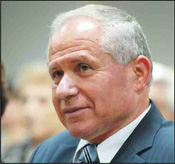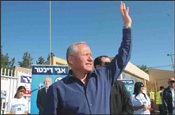Avi Dichter: Shaping Israel's Security and Defense
By Gad Nahshon
Avi Dichter, a prominent member of the Israeli Knesset, representing it's largest party, Kadima, and an expert on Israel's security and defense, has a unique history. He dedicated his life to Israel's security and defense as a fighter as well as the head of Shabak, Israel's General Security Service.
Most of Shabak's activities are domestic, dealing with the issues of security and defense. The famous �Mossad� deals with intelligence issues abroad. There is also Aman, the military intelligence agency which cooperates with the other two. Naturally, there are national discussions and sometimes confrontations among these three agencies. The legendary "father", dealing with civilian affairs was Isar Harel. In the beginning, Shabak was tied to the army. Today it is a civilian organization tied to the office of the Prime Minister.
Avi Dichter, whom I met recently in his Tel-Aviv office, was the 10th head of Shabak (2000-2005). He was nominated to serve along with Meir Dagan (head of the Mossad until 2011) by Arik Sharon. They were considered by many experts, as an exceptionally talented team. Dichter, 59, a father of 3 children, dedicated himself to Shabak for many years. Initially he was responsible for the southern-Israel region and through his many achievements became head of Shabak. Dichter's contributions lasted twenty years and many of his activities are still secret. In the army he was a fighter in a special unit of Aman, called Sayeret Matkal, which performed special missions.
After his career, Dichter joined the Kadima party. Kadima was the integration of former Labor party members and former Likud party members. Dichter became a member in the Knesset and a prominent leader who perhaps may become the next chairman of Kadima. He may end up challenging Bibi Netanyahu in a future election for Prime Minister. Dichter also served as Israel's Minister for Internal Security (Police).
Dichter told me in his parliamentary office in Tel-Aviv, that as a member of a special sub-committee (Foreign and Security Committee) in the Knesset, his role was to shape Israel's national concepts of security and power. He is also a member of the Rights of Children Committee.
At the beginning of our conversation we talked about the Israeli Hasbara (information). In a letter to me, Bibi Netanyahu defined Hasbara as the first front of Israel's war of survival. Many Americans equate Hasbara as propaganda, with all the negative connotations such a term brings up. Perhaps because of the history of Nazi propaganda, we view this term as an anathema to us. One should know that Hasbara, in Hebrew, also means "explanation" and one should not be swayed by its other interpretation.
When I asked Dichter about Iron Dome, Israel's new defense to counter the Gaza's Hamas attacks with missiles and rockets, he said, "This is the best challenge to the Hamas. As to the costs, Israel had the needed resources to solve the problems."
Dichter had an opinion about the Turkish involvement in the attempt to destroy Israel's blockade of Gaza via the flotilla. He said, "There is no reason for Israel to give Hamas an opportunity to control the sea. This will just give them a way to penetrate Israel. No country would give Hamas a gateway to the world or the ability to land airplanes in Gaza, especially since Hamas is a terrorist organization occupying Gaza. Israel built Iron Dome with an investment of 5 million shekels. It appears to be an effective defense. Also, it invested 10 billion shekels in a defense fence (the West Bank)" remarked Dichter.
As far as the Israeli Arabs, Dichter says, "They are 20% of our entire population. They must integrate into Israeli society. We cannot, or should not, push them out of the state. I am against the idea of transfer. I believe that, in the end, they will integrate into the state. For example, recently I celebrated Shavuot in Bror-Heil with many Bedoins from Rahat. This picture symbolized, in my opinion, the future of the Israeli Arabs," said Dichter, who for many years, dealt with issues which were challenged by anti-Israeli Arab activities: "I sent many enemies to our jails," remarked Dichter, with a little smile.
How should we counter the world's waves of terrorism? "In the future, people would not remember who Osama Bin Laden was. We can win by building a new network of co-operation. The terrorist barrel has, also, a bottom," said Dichter, a national expert of defense.
In our conversation, I decided to talk about the USA and the status of Israel inside the American Jewish establishment as well as inside the Jewish communities and centers. I told Dichter about my concern of the rise of the Arab-Muslim lobby in the USA. The Israeli media tends to ignore this anti-Israeli lobby. They work quietly and effectively, often just imitating the Jewish organizations. They also support, financially, Hamas! How can we build a better counter-lobby?
In the United States, Dichter was surprised that even the Israeli students in the academic world and on campuses are not organized. Recently, Dichter visited this country with a Knesset delegation. They visited the campus of Brandies University. In the past, most of its students were Jews. Today, there is an anti-Israeli pro-Palestinian group on this campus. It is typical of many campuses. When Avi Dichter, in a meeting on the campus, spoke briefly about Israel, he was challenged by a few students who attacked him as a representative of an Israel involved in international war crimes against the Palestinian people. Some of these anti-Israeli demonstrators were shockingly actually Israelis! Today, there are all kinds of communication between Israel's extreme left, with its anti-Israeli agenda, and the campuses, including the Jews on these campuses. How can one challenge it? Of course, many of the students Dichter addressed knew that he was a head of the Shabak.
Avi Dichter is also very aware that Israel needs American Jewry, as its partner and pro-Israeli lobby. Dichter stated to me: "There are three equal parts: 6 million Jews live in Israel, more than 6 million Jews live in the Diaspora, most of them in the USA � and we must increase these two communities. The third part is the 6 million Jews who were murdered in the Holocaust." Dichter said that in his visit in the USA, he had a chance to learn and encounter with American Jews. When he spoke at the pro-Israeli lobby (AIPAC), an old man stood up and said, "Mr. Avi Dichter, is it possible that Israel would exist without the support of American Jewry? I answered this question with a question: What kind of meaning does American Jewry have without the existence of Israel? I felt that the audience liked my question." Dichter believes that each community can not exist without Israel. "In each family, the husband, or wife, is pushing their children to visit Israel. There is the Taglit (Birthright Israel) campaign, which sent 250,000 young Jews to visit Israel.
We must invest more in this Jewish youth," said Dichter, optimistically. He believes that now the status of Israel inside American Jewry is stable and strong. We certainly hope that he is right.
At the end of our conversation, I asked if we are going to suffer, again, from Hamas which declares, day and night, that their mission is to destroy Israel. In response Dichter only told me a personal story: "A Hamas missile landed near my mother's home in Ashkelon. We had only to fix the little damage, some broken chards of glass were all over the floor from a broken window�"
That was certainly lucky for Dichter's mother, but, as we all know, luck can only last for just so long.


